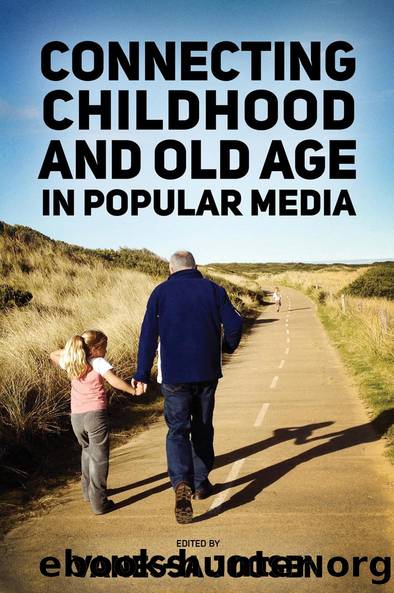Connecting Childhood and Old Age in Popular Media by Vanessa Joosen

Author:Vanessa Joosen [Joosen, Vanessa]
Language: eng
Format: epub
ISBN: 9781496815163
Barnesnoble:
Goodreads: 34919015
Publisher: University Press of Mississippi
Published: 2018-01-19T00:00:00+00:00
Figure 6.2. Still from Starry Starry Night, directed by Tom Shu-Yu Lin.
As the search for Grandpaâs house and Meiâs lively imagination (fueled by her grandfatherâs creations) demonstrate, the elderly play a pivotal role in Starry Starry Night. Released in 2011, the film appeared during a time when Taiwanese youth were more actively asserting their independence. In light of these changes, author Liao and director Tom Shu-Yu Lin express a stirring message about the need to preserve childhood, even when it appears that this version of childhood is merely a figment of the imagination. This message is clearly articulated in the closing scene of the film, when Mei returns to school after her illness. No longer in the company of Jei, Mei reflects on the significance of her journey with her first love:
At 13, weâre very fragile. But at 13, weâre also very tough. So, before we have to face this cruel world, please be gentle with us. We donât ask for much: a glance, a kind word, a rainstorm, a gust of wind, or just a nod of the head goodbye. Itâs these little kindnesses that make us feel special.
Meiâs closing speech reinforces some of the modern views of Taiwanese youth, especially the fact that young people are fragile and âeasily bruise.â Yet, at the same time, it presents childhood, especially the threshold age of thirteen, as a time of contradiction. Children like Mei are both âfragileâ and âtough,â in need of both protection and greater independence. After Mei has returned home, she discovers a letter from Jei with the missing piece from the âbrightest starâ in her Van Gogh Starry Starry Night puzzle. As tears roll down her face, Mei concludes, âEverything passes. But before letting go. Hold on, as tight as you can.â These final lines urge young people to cling to childhood rather than rushing forward into adulthood.
The message in the closing scene of Starry Starry Night differs dramatically from the one that appears in Changâs Wild Child. In the novel Chang makes clear that there is no place for childhood innocence in modern Taiwan, as the destructive forces of modernization have made it impossible for youth to have carefree experiences in their early years. This view is supported by scholarship in Taiwan studies, such as Ban Wangâs assertion that the globalization of Taipei has emotional, cultural, and ideological disadvantages that are bound up in the term modernity. Although modernity elicits âvisions of the future [that] may promise progress, emancipation, freedom, and universal prosperity,â Wang concludes that it âis [often] little more than a euphemism to conceal the global standardization and unequal relations that pave the way for the penetration of capital into underdeveloped countriesâ (370). In contrast, film director Tom Shu-Yu Lin brings to life Liaoâs story of childhood innocence and suggests that there is in fact a space where this innocence can still exist, even if one must fight to obtain it. The fragility of this state of innocence makes it all the more special and reinforces the idea that it is something worth holding onto.
Download
This site does not store any files on its server. We only index and link to content provided by other sites. Please contact the content providers to delete copyright contents if any and email us, we'll remove relevant links or contents immediately.
Cecilia; Or, Memoirs of an Heiress — Volume 1 by Fanny Burney(32558)
The Great Music City by Andrea Baker(32018)
Cecilia; Or, Memoirs of an Heiress — Volume 2 by Fanny Burney(31956)
Cecilia; Or, Memoirs of an Heiress — Volume 3 by Fanny Burney(31941)
We're Going to Need More Wine by Gabrielle Union(19046)
All the Missing Girls by Megan Miranda(16026)
Pimp by Iceberg Slim(14506)
For the Love of Europe by Rick Steves(14121)
Bombshells: Glamour Girls of a Lifetime by Sullivan Steve(14075)
Talking to Strangers by Malcolm Gladwell(13370)
Norse Mythology by Gaiman Neil(13363)
Fifty Shades Freed by E L James(13239)
Mindhunter: Inside the FBI's Elite Serial Crime Unit by John E. Douglas & Mark Olshaker(9342)
Crazy Rich Asians by Kevin Kwan(9291)
The Lost Art of Listening by Michael P. Nichols(7506)
Enlightenment Now: The Case for Reason, Science, Humanism, and Progress by Steven Pinker(7313)
The Four Agreements by Don Miguel Ruiz(6765)
Bad Blood by John Carreyrou(6621)
Weapons of Math Destruction by Cathy O'Neil(6279)
